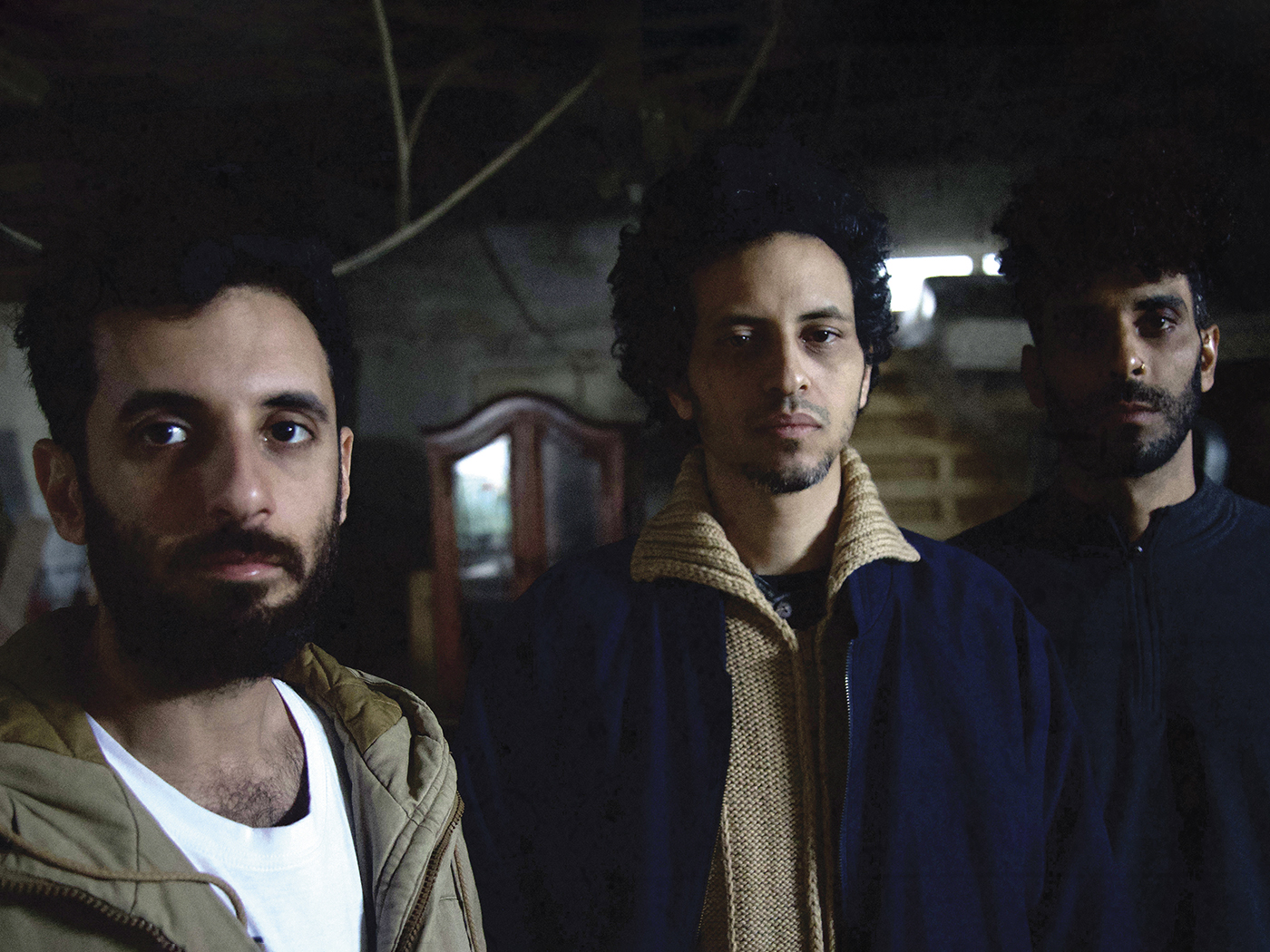Both Jewish and Arab, musically omnivorous but unmistakeably Middle Eastern, globe-trotting trio El Khat are a fascinating hot mess of sounds and influences. Their founder, frontman and primary songwriter Eyal El Wahab is part of the huge Yemeni-Jewish population in Israel, mostly children of refugees who fled persecution in Yemen in the late 1940s, a diaspora now numbering over 400,000. Named after the plant famous for inducing mind-bending euphoria, El Khat’s mission is to keep the unsung cultural heritage of their ancestors alive, but on their own terms, adding a healthy dollop of DIY attitude, psych-rock energy and noisy experimentalism. They are promiscuous folk-punk mongrels, not prim world-music puritans.
El Wahab grew up on sober classical and sacred Jewish music. Indeed, his unlikely apprenticeship for El Khat was teaching himself the cello in his twenties, then joining the Jerusalem Andalusian Orchestra, who specialise in Arabic music from North Africa. But his sonic horizons were blown wide open by the 2012 crate-digging compilation album Qat, Coffee & Qambus: Raw 45s From Yemen, a treasure trove of lost gems, impassioned vocals and lo-fi arrangements that struck a deep chord with his own half-remembered family heritage. Liberated from concert halls, shaking off the shackles of middlebrow good taste, he quit the orchestra and formed El Khat.
El Khat’s restless wanderlust has taken them from Tel Aviv to their current Berlin home, via stopovers in Brooklyn and other destinations. Their third album digs deeper into their signature junk-shop aesthetic, with El Wahab making his own instruments from scavenged scraps of wood, metal and plastic. This extreme form of recycling is both pragmatic and conceptual: partly a homage to his impoverished Yemeni musical ancestors, and partly a quest for a kind of authentically punky rawness, but also an imaginative way of giving the band a unique sound. Mute features water jugs, plates and kitchen implements alongside more conventional cello, trumpet, violin and organ. Previous albums have included the sampled whoosh of subway trains, bleating goats and sheep. El Wahab is an avowed fan of life’s gritty, grungy imperfections.
Already released as a single, album opener “Tislami Tislami” is a gloriously ragged call to arms, its insistent circular melody full of angular scrapes and nerve-snapping twangs, brassy fanfares and tin-can percussion, herky-jerky rhythms and needling vocals. The title derives from a warm-hearted Arabic word for thanks, but El Wahab’s lyric is edged with punky sarcasm apparently aimed at a cheating ex-lover. Part of the English translation says: “Thank you for the endless tears/So we can have many beers… Thank you for going with another man/So I go to the sea more often.”
Another mighty racket is “Commodore Lothan”, a thrillingly kinetic bone-shaker of clattering clonks, knotty tangles, bowed strings and light-touch electronic twinkles. The furiously inventive, impatient, lopsided rhythm here is pure post-punk, sounding like early PiL stuck in a horn-honking traffic jam, with guest vocalist Katrin Lasko adding a sweeter echo to El Wahab’s microtonal warbles and lusty ululations. The title pays playful, in-jokey tribute to the band’s drummer Lotan Yaish, while the lyric is a philosophical poem with a lunar theme: “From the perspective of the moon, there is neither secular nor religious,” El Wahab croons. “From the perspective of the moon, your wealth doesn’t matter…”
A key highlight among the instrumental tracks is El Khat’s skewed love letter to their new Berlin home. “Almania”, the Arabic name for Germany, is a sprawling acoustic action painting that flirts with cosmic dub reggae at times. A skipping, shuffling, exploded tapestry of plucked strings, pitch-bending fanfares and keyboard runs that seem to gallop off into infinity, it radiates immense charm and almost childlike surrealism, a luminous exercise in kindergarten krautrock remixed by Doctor Seuss.
The longest, most complex compositions here are “Zafa” and its louder, faster sequel “Zafa: Talaatam”. The opening section begins as a surging, swaying shanty with a funky metal-bashing rhythm. Then midway through the melody crests a hill and accelerates into a frenzied post-rock maelstrom of explosive percussion, wild swerves and crazed centrifugal energy, an exhilarating runaway train ride that threatens to hurtle off the tracks at any moment.
From the boisterous brassy bustle and vertiginous key changes of “La WaLa” to the perfumed melancholy and tricksy stop-start architecture of closing number “Intissar”, there is precious little second-rank surplus here. A couple of shorter, more conventional tracks are minor weak points, diluting the band’s electrifying fusion mash-up. But for the most part, Mute finds fertile crosstown traffic between ancient and modern, tradition and innovation, harmony and dissonance, local and universal.
When you purchase through links on our site, we may earn an affiliate commission. Here’s how it works.

